Brazil’s squad at the 2017 FIVB World Grand Prix was one of legendary coach José Roberto Guimarães’s first tries at renewing his two time Olympic champion national team for the future. The results were clear and simple: it is going to take some time until Brazil’s new team finds its identity and becomes the well-oiled machine that super-powered through all its competition in the last decade in the way to numerous titles and accolades.
Today, we grade these new faces at their Grand Prix efforts.
Natália Pereira
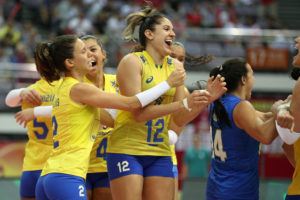
Courtesy: FIVB
What more could we have expected from the tournament’s MVP? This was Natalia´s first major international tournament in the limelight. One of the oldest and most experienced players in the roster, Natália delivered stellar performance and leadership, often carrying the team to victory by herself. She finished the tournament as a top-10 attacker and receiver, all you can expect from an elite opposite hitter.
GRADE: A+
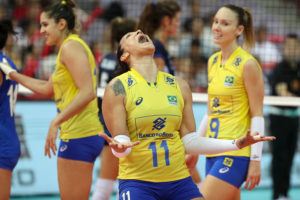
Courtesy: FIVB
Often criticized by Brazilian fans for her weight and oscillating play, this was probably Tandara’s best tournament in her national team career. Often Brazil’s most regular player, she finished at the top-10 in the scoring, attacking and digging statistics. She had multiple 20+ points games, helping Brazil to clinch important contests against its biggest rivals. Together with Natalia, the outside hitter allowed Brazil to boast a dynamic attacking duo, acting as setter Roberta Ratzke‘s safest choices. At only 28 years old, this could be the kick-starter that launches Tandara’s bid at the outside hitter’s starting spot for future tournaments.
GRADE: A
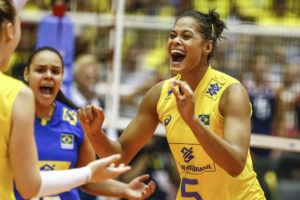
Courtesy: FIVB
Another often criticized player for her oscillating play, Adenizia had a very strong showing at this tournament. Of coach Guimarães’s three middle blockers rotation, Adenizia was probably the most regular player. Spearheading the team’s defense, she finished first at blocks per set at the tournament.
After playing 15 years on the same team, powerhouse Volei Nestle, she transferred to Europe to play for Italy’s Volley Scandicci. This change of environment might have been what was missing for Adenizia, as this was one of the experienced player’s strongest outings in a long time for the national team.
GRADE: B+

Courtesy: FIVB
Regarded in the not so distant past as one of the natural heirs to Brazil’s historic prowess at the middle block position, “Carol” lost some momentum on her climb to stardom after a few irregular years under coach Bernardo Rezende at Unilever/Rio de Janeiro. However, this tournament was a cause for celebration for her fans, as she helped to solidify Brazil’s primarily line of defense, finishing third at blocks per set for the tournament. However, her departure for Turkey is drawing a lot of comments in the Brazilian media about her potential for further progress, as she did not sign with one of Turkish League’s most prominent clubs, opting instead to play for smaller, less glamurous, Nilüfer Belediyespor.
GRADE: B
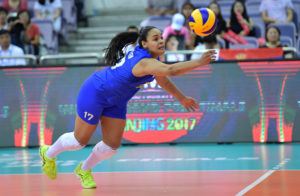
Courtesy: FIVB
The question on who will be Fabiana Oliveira’s heir to Brazil’s libero position is still on the open. This is Suelen’s first major international competition after losing an excess of 70lbs after gastric bypass surgery. Often maligned by the fans for her weight, the new look Suelen was one of Brazil’s passing line’s few reasons to smile, holding her on against tough competition and finishing the tournament as one its top-10 best diggers. Although she still has a long way to go before becoming the favorite for the starting job, she did much to help her cause in the tournament.
GRADE: B
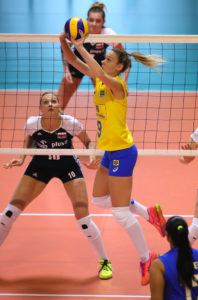
Courtesy: FIVB
It has been a tough climb for the youngster. Thrown at the limelight at a spot once held by Brazil’s greatest sport legends, Roberta is working hard to cement her status as a suitable candidate at Brazil’s starting setter spot. She still has a long way to go before this scenario becomes a reality, though. Her height advantage over her opponents brings the national team a few nice defensive advantages, such as her finishing the tournament as a top-10 blocker. She is also an above average server. However, the Brazilian fans will always judge setters by their setting, not so much as their defense. And by Brazilian standards, she had an average tournament, still showing some difficulties on setting distribution and accuracy. This is only the beginning for the 27 year old though, as she plays under the tutelage of who most would say is the sport’s best setting coach/teacher, Bernardo Rezende.
GRADE: B-
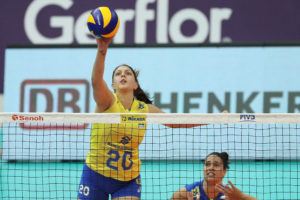
Courtesy: FIVB
Although she had a few strong outings, such as a 5 block showing in the finals, Bia’s overall performance should not have won her a spot at FIVB’s tournament team over the likes of Ana Carolina and Adenizia. Even though the final game of the tournament is its most important game, it can’t be forgotten that Bia’s oscillating performance throughout the tournament wasn’t enough to prevent her from being the Brazil’s only third most used middle blocker. She still has a long way to go before becoming a staple at the national squad, as more than heroic single game performances, Brazil’s squad needs consistence play from all its players at all times.
GRADE: B-

Courtesy: FIVB
The pressure to perform is bigger on Rosamaria than any other Brazilian player. After having captained lots of Brazil’s youth teams, her transition to the professional game has not been without its occasional bumps. However, she has show a lot of personality and is quickly overcoming her difficulties. On this tournament, she was often at times a big spark off the bench, giving Brazil some much needed energy. However, her performance took big dips every time she was thrown at the starting role, losing much of her confidence and efficiency. Expect her to get more chances to shine in the future.
GRADE: C+
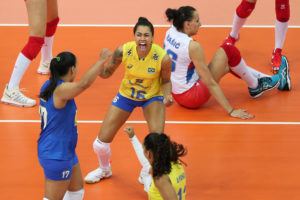
Courtesy: FIVB
Drussyla is a phenomenal young player. At only 21 years old, she has been thrown at the sport’s biggest stages, spearheading Bernado Rezende‘s Unilver/Rio de Janeiro team to the last Superliga Title, sending Dutch star Anne Bujis to the bench along the way. Howerver, she is just too inexperienced to reproduce her prowess in domestic play in the international level, often looking lost at some game’s most crucial moments. She will only get better though. Expect her to be called upon on the next tournaments.
GRADE: C+
BONUS: José Roberto Guimarães
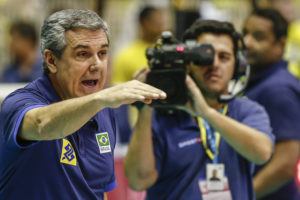
Courtesy: FIVB
Say what you want about his style or treatment of his players, the truth is that only a genius could have taken a below average team full of role players, which struggled mightily at the start of the tournament, to a title finish. Coach Guimarães was able, throughout the tournament, to look at his bench and find precise, definite answers to all of his team’s needs. This was the biggest factor of Brazil’s 2017 FIVB World Grand Prix victory.
GRADE: A+
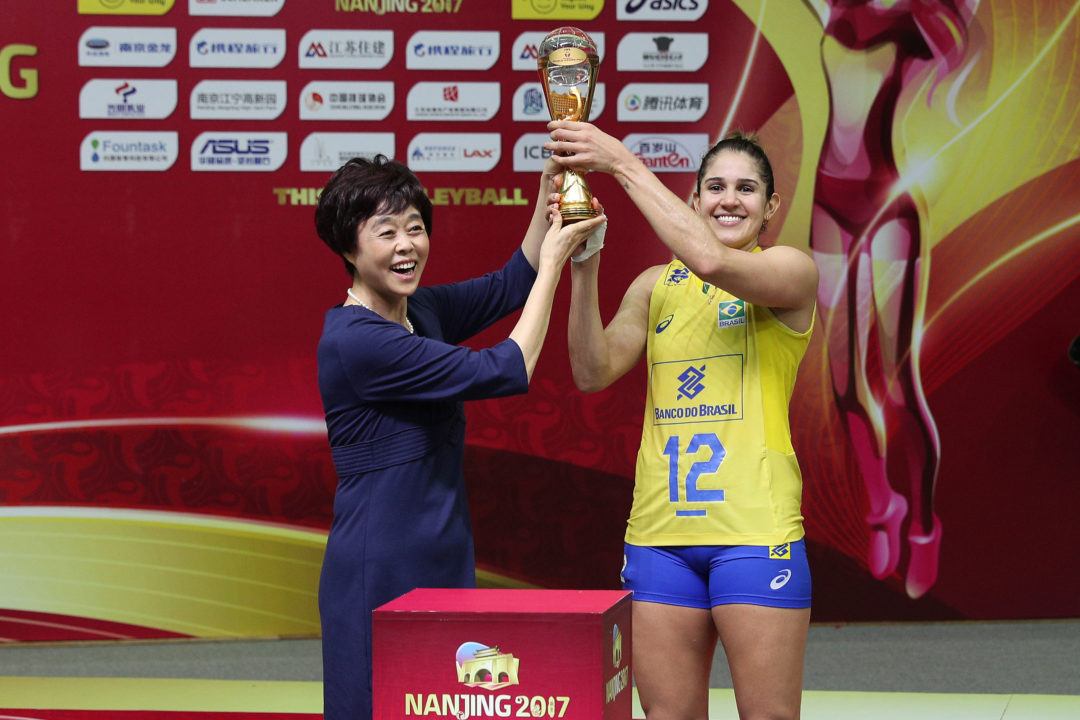
Leave a Reply